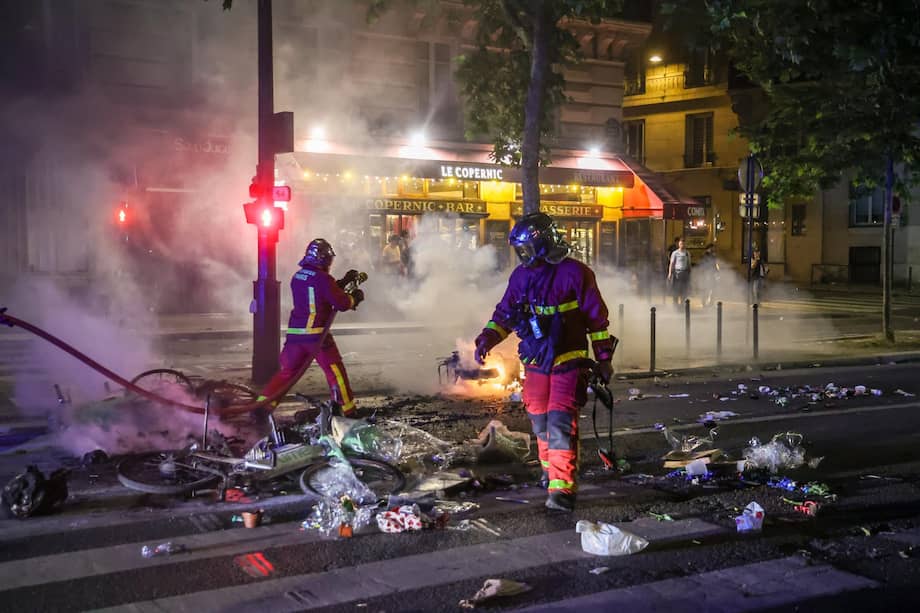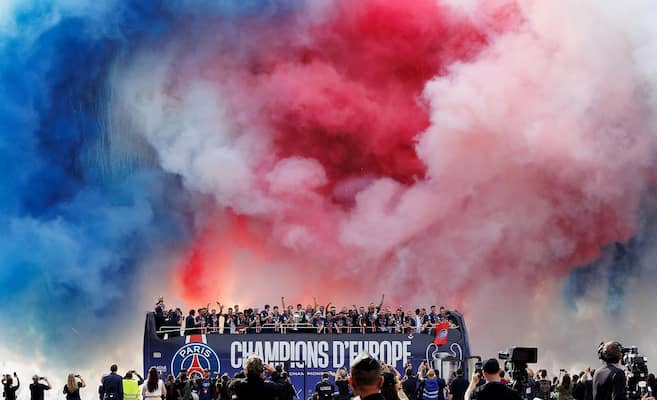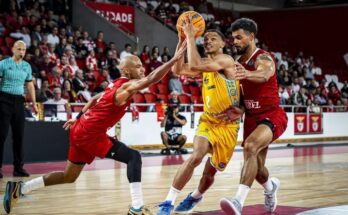
Firefighters turn off a fire in Paris, in the middle of PSG celebrations.
Foto: Efe – Christophe Petit Tesson
Summary and Fast Informame
Listen to this article
Audio generated with Google
Paris lived this weekend a roller coaster of emotions. Of the euphoria overflowed by the first Champions League title in the history of Paris Saint-Germain, after a 5-0 historical win over the Inter Milan in Munich, passed in a matter of hours to the national shock by a series of violent disturbances that left a tragic balance: two dead, dozens of injured and hundreds of detainees.
The celebration dream of generations of Parisian fans ended up tarnished by chaos.
The day after the storm
On Sunday, the French capital dressed as a gala to receive the new European champion. Songs, flags, flares and a crowd of more than 100,000 people gathered in the Elysees fields, where the team paraded in two buses.
Since early, songs like “We are the Champions” and the goals of the final were repeated on giant screens. The peak was the arrival of the players, after five in the afternoon, in a forty minutes tour that culminated in front of the Arc del Triunfo, where fireworks were launched.
The players, dressed in commemorative t -shirts with the number “25” on the back, were received as heroes.
Marquinhos, captain of the team, took the microphone to lead songs and even publicly asked the Golden Ball for his partner Ousmane Dembelé, who was chosen the best player of this edition of the Champions League for UEFA.
Beside him, coach Luis Enrique and the president of the club, Nasser Al Khelaifi, also celebrated the monumental achievement. The Cup, the first 'Orejona' of the PSG and just the second of French football after that of Marseille in 1993, paraded to the rhythm of an excited city.
Chaos in Paris, the shadow of the party
The dark face of the celebrations began to become visible a few hours after the final whistle of Saturday. The night became nightmare.
In Dax, a 17 -year -old was mortally stabbed. In Paris, a young man who mobilized on a motorcycle was hit by a car. In addition, the riots left around thirty police and several injured firefighters. One of them is in a coma after intervening in an operation in Rennes.
☪️🇫🇷 France
Last night, in Paris in the “celebration” of the victory in Champions of the PSG: 2 dead, 192 wounded, 426 detainees and hundreds of millions of euros in damage in a night of chaos …
How many more times will this happen before Europe finally wakes up? 🤔 pic.twitter.com/CUWd0Idf8D
– Emy Ayuso (@emy_ayuso) June 1, 2025
The magnitude of the excesses was such that the Ministry of Interior reported 559 people detained – 491 alone in Paris – and more than 690 fires, of which 264 affected vehicles.
Looting, vandalism and aggressions broke the spirit of unity that usually characterizes a sporting deed of this size. The security device was broad, but insufficient to contain violence.
The President of the Republic, Emmanuel Macron, condemned the facts hard to receive the champion team at the Elysium Palace. “Nothing can justify what happened in the last hours, violent clashes are unacceptable,” said the president.
“We will pursue, we will punish, we will be relentless,” he added, visibly outraged by the tragic turn that the celebrations took.
🇫🇷 3 am in Paris and there are still some skirmishes with the police, who try to advance dodging the fireworks that throw them.
At the moment there are 153 detainees and several injured, in addition, 8 people were run over different places pic.twitter.com/9GmOoxHfln
– 🥊𝕳 Bars of the World ⚽🍺 (@Barras_latam) June 1, 2025
Macron not only reiterated his rejection of violent acts, but also wanted to highlight the feat of the team. “You got it in a sublime, monstrous way, you have put Paris at the top of Europe, it is magnificent,” he said in front of the players, before applauding Luis Enrique's work for building a team “strong for her solidarity, motivation and ambition.”
In his message, the president emphasized that “football is not that” and regretted that the incidents “deprived many of our compatriots of what should have been a moment of happiness and carefreeness.” The phrase resonated in media and social networks as a clear complaint against the instrumentalization of a sports triumph to justify violent behaviors.
From the club a firm statement was also issued: “Paris Saint-Germain strongly condemns the incidents that tarnished a moment of collective happiness. This must be a shared pride time, not agitation or disturbances.” The note was published in X (formerly Twitter) and asked fans responsibility and respect. Hours before, Interior Minister Bruno Retilleau had described as “barbarians” those responsible for the acts of vandalism and defended that the police operation had been “up to it.”
The contrast between the sports feat and urban chaos has not gone unnoticed. Local media speak of a “stained” victory, not because of the PSG's performance – which was blunt, brilliant and historical – but because of the inability of a part of society to celebrate without violence. The image of the triumphant Paris, with Marquinhos raising the cup under the arch of triumph, faces the Paris of burned vehicles and mass arrests.
In that double emotional record, France awakens with found feelings: sports pride and social shame. The PSG fulfilled the promise that had to his fans for decades, and did so with a spectacular, almost unreal football. But the riots raise urgent questions about the management of public order, the culture of football and urban social fabric.
Camille, a 22 -year -old student who attended the parade, summarized it like this: “Seeing the Cup in person allows you to realize that we are really, that we are European champions. Yesterday it was almost too beautiful to be true. But today, seeing the news, a part of that joy breaks.”
What should be an unforgettable celebration for happy reasons will also be for reasons that no one would have wanted to write. Paris burned, yes, but not only because of the passion of football.
🚴🏻⚽🏀 The latest in sports?: Everything you should know about world sport is in the spectator



